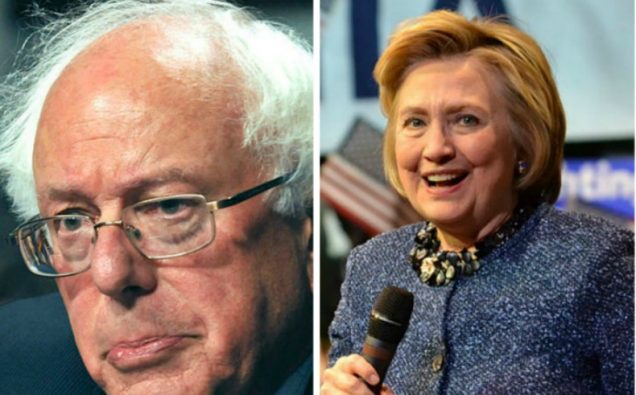
After experiencing one of the most divisive election campaigns in the U.S. history, Americans may see more tension at conventions of both the Republicans and the Democrats are to hold in July to nominate their candidates November 8 presidential election race .
Until recently, only Trump was feared to confront a hostile convention as many of his party’s stalwarts have refused to accept him as their nominee and some are even trying to draft a third-party candidate to stop the billionaire real-estate tycoon.
A Democratic convention in Nevada this weekend, however, showed Clinton could also face strong opposition at her party’s convention from Sanders’ supporters, although nothing is likely to change her position as the majority Democratic choice.
Donald Trump is the presumptive Republican nominee from a starting line-up of as many as 17 candidates, while former Secretary of State Hillary Clinton is but certain to win the Democratic nomination against Vermont Senator Bernie Sanders.
But both Trump and Clinton, most opinion polls show are the most unfavorable candidates, up against intense opposition from their own parties’ ranks amid fear many voters might switch loyalties in the November polling out of hatred for their own party’s candidate.
For Clinton, the veteran Senator from Vermont has been a stubborn rival who has vowed to take the fight to the end, though the fight could effectively end on June 7 when the two will face-off in the California Primary with 548 delegates up for grab.
With 2,240 delegates, including super-delegates, Clinton is just shy of 143 delegates to clinch the nomination as against Sanders who will have to win nearly two-third of the remaining 1,052 delegates, something he says is a “steep hill to climb”.
The real bone of contention is the super-delegates, party leaders and elected officials who are free to pick their choice, unlike the pledged delegates who are won during primaries and caucuses. Clinton has so far support of 542 delegates as against 40 who are backing Sanders.
Sanders has challenged party rules for superdelegates and the primary system which he says are undemocratic and favor the former First Lady. Critics of the current system say superdelegates should vote for the winner of their state.
The rumpus at the weekend Democratic Convention in Nevada gave a glimpse of what could happen at the July 25-28 Democratic National Convention at the Well Fargo Center in Philadelphia. The scene was one of chaos and commotion, a replay of what was witnessed at several of Trump’s rallies.
Many Senators from the Democratic Party condemned the pandemonium, saying this must stop. But, the Sanders’ campaign appeared defiant and the Senator himself stood by his supporters.
“It is imperative that the Democratic leadership, both nationally and in the states, understand that the political world is changing and that millions of Americans are outraged at establishment politics and establishment economics,” Sanders said in a statement as votes were cast in Kentucky and Oregon primaries.
Such a chaotic scenario could be repeated at the national convention which Clinton’s supporters fear could divide the Democratic votes in favor of Trump. Many of Sanders’ voters, though not a significant majority, have said they will vote for Trump rather than Clinton, their own party nominee.
On the Republican side, in spite of being a presumptive nominee, Trump still must pass several hurdles.
Needing to win 1,237 delegates, Trump has so far pocketed 1,134. Although certain to fall short of the required number – only 435 delegates left to be allocated – Trump is sole contender for the slot to be decided in the convention which many top party leaders have reportedly said to sit out. They include two former presidents, George W. Bush and George H.W Bush as well as Jeb Bush who ran for the Republican presidential nomination. Sen. John McCain, the 2008 Republican nominee said last month he would skip as well.
The real danger Trump faces is the prospect of a third-party candidate which will divide Republican vote, assuring victory for Clinton. According to a May 14 report by the Washington Post, Mitt Romney, the 2012 Republican presidential nominee, is among a band of exasperated Republicans who are plotting to block Trump’s path to the White House.
According to a report by Vice News, a news organization, chances for a third-party outsider becoming president are thin, but the 12the Amendment of the Constitution does provide a pathway for such a scenario.
If a third-party candidate deprives Trump and Clinton, the likely Democrat nominee, the required 270 electoral votes, it will then go to the House of Representatives to decide where each state delegation would be afforded one vote. With the house controlled by Republicans, it is here where the anti-Trump Republicans hope to turn the table on the New Yorker who has no previous political experience.













